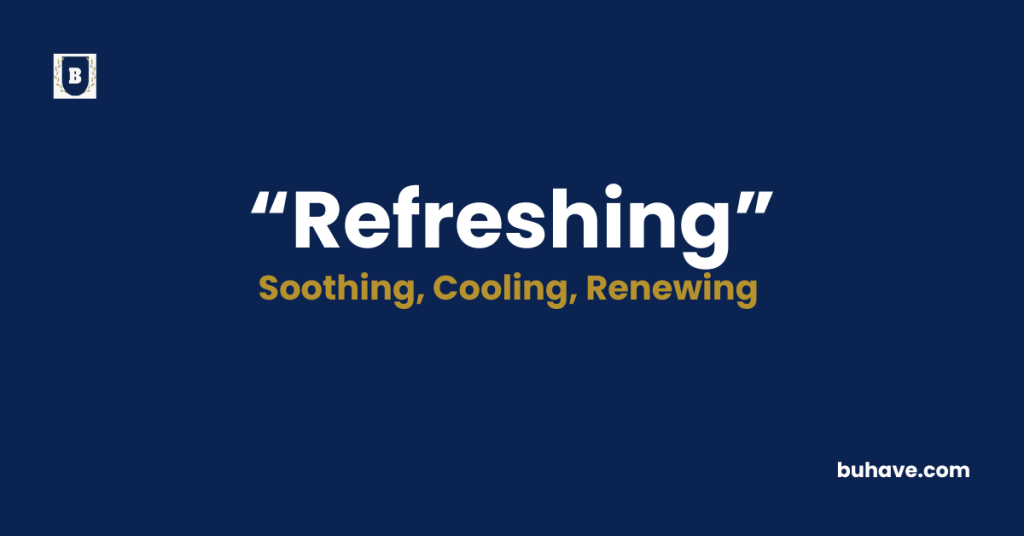The word ‘Refreshing’ (Adjective) describes that something brings a feeling of renewed energy, comfort, or clarity. in this guide, you’ll learn the full definition, synonyms, antonyms, etymology, and real-life examples of how to use ‘Refreshing’ correctly in sentences.
Refreshing Explained in Depth
A complete and detailed guide to the words Refreshing including meaning, definition, examples, etymology, synonyms, and antonyms.
Meanings of Refreshing
The word “refreshing” means that something brings a feeling of renewed energy, comfort, or clarity. When we describe something as refreshing, we usually mean it stands out in a pleasant way—especially when compared to what came before it. For example, after working for hours without a break, taking a walk in the cool air feels refreshing because it helps clear your mind and recharges your body. Likewise, when someone speaks with honesty and kindness in a stressful situation, their attitude might seem refreshing, as it creates a sense of ease and relief.
In everyday life, people use the word “refreshing” for many things—such as a glass of cold lemonade, a new perspective, a change of scenery, or even a kind gesture—because these things tend to lift your spirits and give you a fresh start. So, rather than dragging you down or adding pressure, anything it actually helps you feel more alive and positive.
Definition:
It refers to something that brings a sense of renewal, invigoration, or revitalization. It describes experiences, actions, or things that provide relief, and restoration.
The word “refreshing” describes something that actively brings a sense of renewal, energy, or clarity. For instance, after a long, exhausting day, taking a cool shower immediately feels fresh because it revives the senses and lifts your mood. Moreover, this term often applies to situations or ideas that break away from monotony and introduce something pleasantly different.
Instead of remaining stuck in routine, a new change offers relief and excitement. Whether it’s a breeze on a hot day, a drink after exercise, or a new approach to a problem, “refreshing” always suggests a welcome burst of vitality and positivity. Consequently, it adds brightness and liveliness to an otherwise dull or tiring experience.
Etymology
The etymology of the word “refreshing” comes from a blend of Latin and Old French roots, evolving into its modern English form over time. Here’s a breakdown:
- Prefix: “re-” – from Latin, meaning “again” or “back.”
- Root: “fresh” – from Old English fersc, meaning “fresh, pure, sweet” (especially of water). This term is believed to have Germanic roots, related to Old High German frisc and Dutch vers.
- Suffix: “-ing” – a common English suffix used to form present participles or gerunds.
So, “refreshing” literally means “making fresh again.” It entered Middle English as “refreschen” via Old French refreschir, which also stems from the same Latin and Germanic origins.
Example Sentence:
- After a long hike, in fact, the cold lemonade was incredibly refreshing and instantly lifted our spirits.
- Moreover, the gentle rain in the evening brought a refreshing change to the dry and dusty weather.
- On the other hand, her honesty stood out in a room full of renewing speeches.
Refreshing Synonyms:
- Invigorating
- Revitalizing
- Bracing
- Energizing
- Stimulating
- Uplift
- Cooling
- Restorative
- Renewing
- Rejuvenation
Refreshing Antonyms:
- Exhausting
- Tiring
- Draining
- Fatiguing
- Stale
- Dull
- Unpleasant
- Overwhelming
- Depressing
- Dehydrating
FAQs about Refreshing
Here are some frequently asked questions (FAQs) about the word “refreshing”:
1. What does “refreshing” mean in simple terms?
“Refreshing” means something that makes you feel better, more awake, or full of energy again. It can also mean something pleasantly different or new.
2. Can “refreshing” describe a person?
Yes, you can describe a person as “refreshing” if their attitude, honesty, or behavior feels uplifting, sincere, or pleasantly different from what you’re used to.
3. Is “refreshing” only used for physical things like drinks or air?
No, while it is commonly used for physical experiences like a cold drink or a breeze, it can also describe emotional or mental experiences, like a refreshing idea or a refreshing conversation.
4. What are some common situations where people use the word “refreshing”?
- People often use it when talking about:
- Weather (“The breeze was so refreshing.
- Drinks/food (“That iced tea was refreshing.
- Conversations (“Talking to her was refreshing.
- Change in routine (“It was refreshing to take a day off.
5. Is “refreshing” a positive word?
Yes, it usually carries a positive tone, suggesting that something improves your mood, comfort, or energy.
6. Can “refreshing” be used in a professional setting?
Absolutely. You can use it to describe new ideas, honest feedback, or a positive shift in workplace dynamics. For example: “Her refreshing approach to teamwork boosted everyone’s morale.”
Explore more R words:

















